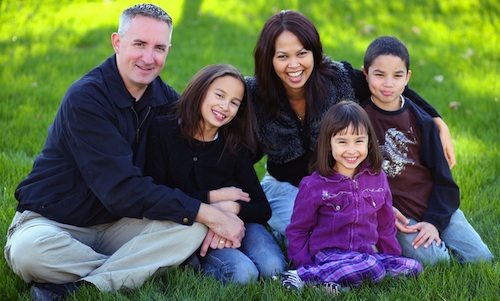The issue of a state’s right to define marriage as between a man and a woman is winding its way through the court system, and it is likely on its way to the U.S. Supreme Court later this year. Proponents of same-sex unions argue that marriage is a “fundamental right.” One justice in the U.S. Court of Appeals for the 10th Circuit Court hearing arguments compared the ban on same-sex marriage to laws prohibiting interracial marriage decades ago, asking what is the difference between the two? But there are more important questions that must be answered: Why does it take a man and a woman to create a child? Why has marriage been—from our very first parents—the standard for bringing children into the world? What role does marriage play in society at large? And why does traditional marriage deserve a protected status? These are the relevant questions to answer.
Traditional marriage has a foundation thousands and thousands of years in the making. Same-sex marriage is still in the experimental stage. If as a society we succumb to the rhetoric that traditional marriage supporters are anti-gay, bigoted and hateful, we turn our backs on the fundamental, rational reasoning that has held societies and nations together for millennia—as well as the democratic ideals upon which our country was founded. The family is the fundamental unit of society. Not just any family unit, but the family unit that provides a stable and protective foundation to bring children into the world. It is our responsibility as adults—the ones who are supposed to protect children—to make the world a better place for future generations. The reality is that the fight to protect traditional marriage is just that: A fight to protect the definition, sanctity and importance of marriage between a man and a woman.Opposition to Same-Sex Marriage Isn’t Bigotry
Defenders of traditional marriage often do so based on their religious beliefs as well as their experience with families. A 53-page so-called “friend-of-the-court” brief filed with the 10th Circuit Court by five religious organizations, including The Church of Jesus Christ of Latter-day Saints (sometimes inadvertently called the Mormon Church), said:
Faith communities like ours are among the essential pillars of this Nation’s marriage culture. With our teachings, rituals, traditions, and ministries, we sustain and nourish both individual marriages and a culture that makes enduring marriages possible. We have the deepest interest in strengthening the time-honored institution of husband-wife marriage because of our religious beliefs and also because of the benefits it provides to children, families, and society. Our practical experience in this area is unequaled. In millions of ministry settings each day we see the benefits that married mother-father parenting brings to children. And we deal daily with the devastating effects of out-of-wedlock births, failed marriages, and the general decline of the venerable husband-wife marriage institution.
Religious leaders shepherd their flocks through times of trial—and see firsthand the devastating effect of the breakdown of the family. They are uniquely qualified to answer the questions of why the traditional family unit is so important. The brief continues:
In truth, we support the husband-wife definition of marriage because we believe it is right and good for children, families and society. Our respective faith traditions teach us that truth. But so do reason, long experience and social fact. … Faith communities and religious organizations have a long history of upholding traditional marriage for reasons that have nothing to do with homosexuality. Their support for husband-wife marriage precedes by centuries the very idea of same-sex marriage.
For The Church of Jesus Christ and other religious organizations, support for traditional marriage stems from their belief in God and in His commandments. Elder Dallin H. Oaks, a member of the Quorum of the Twelve Apostles (with the First Presidency, the governing body of The Church of Jesus Christ), said:
Man’s laws cannot make moral what God has declared immoral. … Laws legalizing so-called “same-sex marriage” do not change God’s law of marriage or His commandments and our standards concerning it.
People of faith believe that we are here on earth as part of God’s divine plan for His children—because we are all literal spirit children of our Father in Heaven. Elder Oaks explained:
For Latter-day Saints, God’s commandments are based on and inseparable from God’s plan for His children—the great plan of salvation. This plan, … explains our origin and destiny as children of God—where we came from, why we are here, and where we are going. The plan of salvation explains the purpose of creation and the conditions of mortality, including God’s commandments, the need for a Savior, and the vital role of mortal and eternal families. … Our theology begins with heavenly parents, and our highest aspiration is to attain the fulness of eternal exaltation. We know this is possible only in a family relationship. We know that the marriage of a man and a woman is necessary for the accomplishment of God’s plan. Only this marriage will provide the approved setting for mortal birth and to prepare family members for eternal life. We look on marriage and the bearing and nurturing of children as part of God’s plan and a sacred duty of those given the opportunity to do so. We believe that the ultimate treasures on earth and in heaven are our children and our posterity.
Because marriage and children are central components of this plan, believers feel obligated to defend traditional marriage for the sake of children. Elder M. Russell Ballard, an Apostle of Jesus Christ, explained:
Church leaders have the responsibility to speak out on moral issues and to counsel individuals and families. The family is the basic unit of society; it is the basic unit of eternity. Thus, when forces threaten the family, Church leaders must respond.
The family is at the heart of Heavenly Father’s plan because we are all part of His family and because mortality is our opportunity to form our own families and to assume the role of parents. It is within our families that we learn unconditional love, which can come to us and draw us very close to God’s love. It is within families that values are taught and character is built. Father and mother are callings from which we will never be released, and there is no more important stewardship than the responsibility we have for God’s spirit children who come into our families.
Elder Neil L. Andersen, an Apostle of Jesus Christ, said:
While many governments and well-meaning individuals have redefined marriage, the Lord has not. In the very beginning, God initiated marriage between a man and a woman—Adam and Eve. He designated the purposes of marriage to go far beyond the personal satisfaction and fulfillment of adults to, more importantly, advancing the ideal setting for children to be born, reared, and nurtured. Families are the treasure of heaven.
Why do we continue to talk about this? As Paul said, “We look not at the things which are seen, but at the things which are not seen.” As Apostles of the Lord Jesus Christ, we have the responsibility to teach our Creator’s plan for His children and to warn of the consequences of disregarding His commandments.
The Nuclear Family is the Fabric of Human Society
The traditional, or nuclear, family is the fabric that holds society together. The marriage covenant regulates the use of the procreative powers—the ability for a man and a woman to create life—and provides a stable foundation for bringing children into the world. It binds husbands and wives to each other, and the children to their parents. From the beginning, our first parents Adam and Eve were married and commanded to have children. In that order. Their commitment to each other provided the framework into which their children were born, nurtured and taught. They formed the first family on the earth, setting the example for generations to follow and teaching their children the ways of God. The 2012 State of Our Unions report explained:
Throughout history, marriage has first and foremost been an institution for procreation and raising children. It has provided the cultural tie that seeks to connect the father to his children by binding him to the mother of his children. …
There is now ample evidence that stable and satisfactory marriages are crucial for the well-being of adults. Yet such marriages are even more important for the proper socialization and overall well-being of children. A central purpose of the institution of marriage is to ensure the responsible and long-term involvement of both biological parents in the difficult and time-consuming task of raising the next generation.
Children need both biological parents because mothers and fathers have complementary roles. Husbands are the protectors and providers and mothers are the caregivers and nurturers. Elder Russell M. Nelson, an Apostle of Jesus Christ, taught:
… Parenting is a joint venture. The father exercises his leadership with light and love, never in any degree of unrighteousness. The mother provides the intuition, the inspiration, and the nurture that come from her so naturally.
The late Elder James E. Faust, until his death, an Apostle of Jesus Christ, explained:
For centuries the family was the bedrock of this and many other nations. It was the glue that held society together. Now many families are in trouble, and the glue is coming unstuck. As a result, many children are bewildered: they are growing physically but lack the support system, the disciplined moral framework, and the love and understanding that a strong family can provide.
It is in a home and with a family that values are usually acquired, traditions are fostered, and commitments to others are established. There are really no adequate substitutes. Church, school, and government programs can only reinforce and supplement that which is acquired at home. …
Alternatives to the legal and loving marriage between a man and a woman are helping to unravel the fabric of human society. That fabric, of course, is the family. These so-called alternative life-styles cannot be accepted as right because they frustrate God’s commandment for a life-giving union of male and female within a legal marriage (see Genesis 1:28). If practiced by all adults, these life-styles would mean the end of family.
Traditional marriage is the fabric that holds human society together because it is here where we are taught our values, morals and fundamental beliefs. President Gordon B. Hinckley, until his death, the prophet of The Church of Jesus Christ, taught:
A nation will rise no higher than the strength of its homes. If you want to reform a nation, you begin with families, with parents who teach their children principles and values that are positive and affirmative and will lead them to worthwhile endeavors. That is the basic failure that has taken place in America. And we are making a tremendous effort to bring about greater solidarity in families. Parents have no greater responsibility in this world than the bringing up of their children in the right way, and they will have no greater satisfaction as the years pass than to see those children grow in integrity and honesty and make something of their lives.
Redefining marriage would reform America’s homes by weakening the foundation upon which they are built. And if a nation will rise no higher than the strength of its homes, we owe it to ourselves to strengthen our homes, defend our families and protect the sanctity of our marriages. Marriage does matter—and it matters how it is defined. Why does traditional marriage deserve a protected status in our society? Because it is the only union capable of producing offspring—and it is the children, not the adults, who need to be protected.
Marriage Between a Man & Woman is Good Public Policy
In addition to benefiting children, traditional marriage, frankly, is good public policy. It is economically beneficial for both spouses, and it eases the economic burden on society when both parents work together to provide for their children. The 2012 Report State of Our Unions found:
The institution of marriage itself provides a wealth-generation bonus. It does this through providing economies of scale (two can live more cheaply than one), and as implicitly a long-term personal contract it encourages economic specialization. Working as a couple, individuals can develop those skills in which they excel, leaving others to their spouse. Also, married couples save and invest more for the future, and they can act as a small insurance pool against life uncertainties such as illness and job loss. …
Beyond the economic advantages of marriage for the married couples themselves, marriage has a tremendous economic impact on society. … Research has consistently shown that divorce and unmarried childbearing increase child poverty. In recent years the majority of children who grow up outside of married families have experienced at least one year of dire poverty…. The rise in child poverty, of course, generates significant public costs in health and welfare programs.
Marriages that end in divorce also are very costly to the public. One researcher determined that a single divorce costs state and federal governments about $30,000, based on such factors as the increased use of food stamps and public housing as well as increased bankruptcies and juvenile delinquency. The nation’s 1.4 million divorces in 2002 are estimated to have cost the taxpayers more than $30 billion.
Traditional marriage binds husbands and wives to their children, providing a stable foundation to bring children into the world. The financial costs alone of the breakdown of the family are staggering. Elder Oaks said:
Few measures of the welfare of our rising generation are more disturbing than the recent report that 41 percent of all births in the United States were to women who were not married. Unmarried mothers have massive challenges, and the evidence is clear that their children are at a significant disadvantage when compared with children raised by married parents. …
We should assume the same disadvantages for children raised by couples of the same gender. The social science literature is controversial and politically charged on the long-term effect of this on children, principally because, as a New York Times writer observed, “same-sex marriage is a social experiment, and like most experiments it will take time to understand its consequences.”
These are all very compelling reasons for the courts to uphold the sanctity of marriage between a man and a woman. As eager as the courts seem to be to break new ground on the marriage front, they owe it to the nation as well as to future generations to slow down and really listen to those who are on the front-lines of the marriage culture—religious leaders who are dealing with the aftermath of the breakdown of the family.
Traditional Marriage is Different and Deserves Protection
The government’s role is to protect the common good. History has proven that this is best done by preserving and protecting traditional marriage and the family unit. The amicus brief concluded:
Marriage, understood as the union of one man and one woman, remains a vital and foundational institution of civil society. The government’s interests in continuing to encourage and support marriage are not merely legitimate but compelling. No other institution joins together two persons with the natural ability to create children for the purpose of maximizing the welfare of such children. No other institution strives to ensure that children have the opportunity of feeling a sense of security and being raised in a stable household by the mother and father who conceived them. Undermining the husband-wife marital institution by redefining it to include same-sex couples will, in the long term, harm vital child-welfare interests that only the husband-wife definition can secure. The result will be more mothers and fathers concluding that the highest end of marriage is not the welfare of their children but the advancement of their own life choices. We know, from personal experience over numerous decades of ministering to families and children, that more focus on satisfying adult needs will not benefit vulnerable children. The societal ills caused by the deterioration of husband-wife marriage will only be aggravated if the State cannot reserve to marriage its historic and socially vital meaning.
Traditional marriage deserves protection and its own unique status because it is different. Traditional marriage has a power that no other relationship does. It was ordained of God from the beginning of the world. Elder Boyd K. Packer, an Apostle of Jesus Christ, taught:
I have seen and heard, as you have seen and heard, the signals all about us, carefully orchestrated to convince us that marriage is out of date and in the way. … Marriage is the shelter where families are created. That society which puts low value on marriage sows the wind and, in time, will reap the whirlwind—and thereafter, unless they repent, bring upon themselves a holocaust!
The same warning applies to those who would make a mockery of marriage in same-sex unions. Elder Packer also warned:
There are both moral and physical laws “irrevocably decreed in heaven before the foundations of this world” that cannot be changed. History demonstrates over and over again that moral standards cannot be changed by battle and cannot be changed by ballot. To legalize that which is basically wrong or evil will not prevent the pain and penalties that will follow as surely as night follows day.
Opposition to same-sex marriage isn’t based on bigotry—it’s based on belief in God, His commandments and His plan for His children. It’s based on a fundamental desire to preserve and protect the family and its place as the foundational unit of society. Those who would redefine marriage to include same-sex unions would replace the strength of the family with a counterfeit replica.




